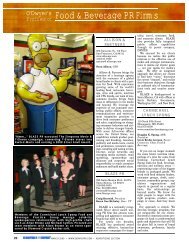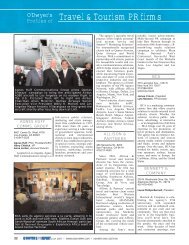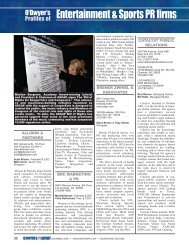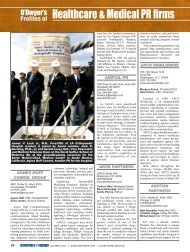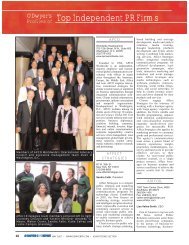multicultural pr special report - Odwyerpr.com
multicultural pr special report - Odwyerpr.com
multicultural pr special report - Odwyerpr.com
- No tags were found...
Create successful ePaper yourself
Turn your PDF publications into a flip-book with our unique Google optimized e-Paper software.
EDITORIALSocial media thrives at expense of user <strong>pr</strong>ivacyStudies show that while the Internet is growing each minute, its users are be<strong>com</strong>ingincreasingly stationary. Facebook, YouTube and Wikipedia aren’t the only Web sitesout there, but each year they’re be<strong>com</strong>ing the only sites people visit. Web 2.0’s crosspollination of content has enabled social media to limit users’ range of motion, thus servingas a sort of one-stop-shop for content.These social habits run contrary to the core <strong>pr</strong>inciples espoused during the Web’s incipience,which hailed the Internet as a wild west of anything-goes content. Users with no codingexperience (and less design savvy) built personalized Web pages catered to any range oftopics, igniting the public on a never ending URL quest for the newest thing. It introduced usto some bad content, but nonetheless offered for the first time a virtually endless library at ourfingertips.In sociological terms, this is known as the “The Strength of Weak Ties,” or the idea thatinformation we receive on the periphery of our social contacts is more likely to be novel orinformative than what we receive from our closest peers.The more immobile users stay on the Web, the less likely they are to be introduced to newinformation. Closed, centralized systems like Facebook reinforce a strong confirmation bias:we begin viewing the same news sources, recycling the same anecdotes, connecting with thesame people. Even when offered an endless sea of content, we eventually find and fill niches,defaulting on content that reiterates our <strong>pr</strong>econceived perceptions.We seem to enjoy our new self-made cyber cubicles so much that we reward <strong>com</strong>paniesthat turn users into marketing metric lab rats. Much oftoday’s online <strong>pr</strong>ofit structure is built on amodel of loading brand messages on users’backs in the guise of content, at theexpense of our <strong>pr</strong>ivacy and every <strong>pr</strong>incipleupon which the Web was founded.Facebook, which initially touteditself as a safer alternative to <strong>com</strong>petingsocial networks, has since pulled ablatant bait-and-switch, increasinglysoftening the terms of its <strong>pr</strong>ivacy <strong>pr</strong>acticesso it can monetize the growing databaseof information it stores on its users.Facebook turns its users into brand ambassadors,allowing site advertisers to poach personalconversations, contacts, employment history, <strong>pr</strong>eferencesand identity so they can later be targeted for marketing messages. The site has also madenumerous undisclosed attempts to share users’ personal information with third parties, eitherby surreptitiously adding browser habits to user <strong>pr</strong>ofiles without their knowledge or even byleasing personal information abroad when users visit third-party partner sites.Google isn’t far behind. This year the <strong>com</strong>pany debuted its Buzz application, a social mediatool that allows users to integrate third party network updates into the <strong>com</strong>pany’s Gmail service.As a user default, Buzz <strong>pr</strong>esumptuously populates <strong>pr</strong>ofiles with fellow Gmail contactswhom users connect with frequently. Interestingly enough, it’s Google’s oldest networkingtools that take cyber intrusion to the ultimate level: Google logs every search you’ve madeinto a massive database along with your IP address. Google’s Gmail service even mines thecontents of users’ personal emails so they can later be pitched corresponding ad copy.It amazes me that these <strong>pr</strong>actices are knowingly permitted by users. It’s as if we allow content<strong>pr</strong>oviders the right to snoop into our <strong>pr</strong>ivate business simply because we’re getting somethingfree, or if we just surrender our <strong>pr</strong>ivacy altogether because a pornographic transparencyis de rigueur in the Internet age, as if a new technology somehow permits a separationbetween what’s on our hard drives and what’s in our bedroom closets. It doesn’t.In a May Washington Post op-ed, Facebook CEO Mark Zuckerberg <strong>pr</strong>omised he’d makeit easier for users to opt out of having their information given to third parties. Note he did notsay Facebook would not give away users’ information unless we ask them to.The Internet is where the glut of our future conversations will take place. Continuing toallow these <strong>pr</strong>actices sends the message that we don’t care about our <strong>pr</strong>ivacy, that new technologiesare an excuse to rewrite existing social permissions, that we’ll allow being takenadvantage of in return for a free service. Contrary to a crop of recent terms that claim otherwise,nothing is “free” on the Internet. We’ve simply been getting what we’ve paid for. — Jon GingerichEDITOR-IN-CHIEFJack O’Dwyerjack@odwyer<strong>pr</strong>.<strong>com</strong>ASSOCIATE PUBLISHERKevin McCauleykevin@odwyer<strong>pr</strong>.<strong>com</strong>EDITORJon Gingerichjon@odwyer<strong>pr</strong>.<strong>com</strong>SENIOR EDITORGreg Hazleygreg@odwyer<strong>pr</strong>.<strong>com</strong>CONTRIBUTING EDITORSFraser SeitelRichard GoldsteinChristine O’DwyerADVERTISING SALESJohn O’DwyerAdvertising Sales Managerjohn@odwyer<strong>pr</strong>.<strong>com</strong>Joshua FiermanNational Advertising Re<strong>pr</strong>esentativejoshua@odwyer<strong>pr</strong>.<strong>com</strong>Jack FogartyNational Advertising Re<strong>pr</strong>esentativejfogarty@odwyer<strong>pr</strong>.<strong>com</strong>O’Dwyer’s is published monthly for $60.00a year ($7.00 for a single issue) by theJ.R. O’Dwyer Co., Inc.,271 Madison Ave., New York, NY 10016.(212) 679-2471Fax (212) 683-2750.© Copyright 2010J.R. O’Dwyer Co., Inc.OTHER PUBLICATIONS &SERVICES:www.odwyer<strong>pr</strong>.<strong>com</strong> breaking news,<strong>com</strong>mentary, useful databases and more.Jack O’Dwyer’s Newsletter An eightpageweekly with general PR news, mediaappointments and placement opportunities.O’Dwyer’s Directory of PR Firms haslistings of more than 1,850 PR firms throughoutthe U.S. and abroad.O’Dwyer’s PR Buyer’s Guide lists 1,000+<strong>pr</strong>oducts and services for the PR industry in 54categories.jobs.odwyer<strong>pr</strong>.<strong>com</strong> O’Dwyer’s onlinejob center has help wanted ads and hostsresume postings.6 JUNE 2010 WWW.ODWYERPR.COM



